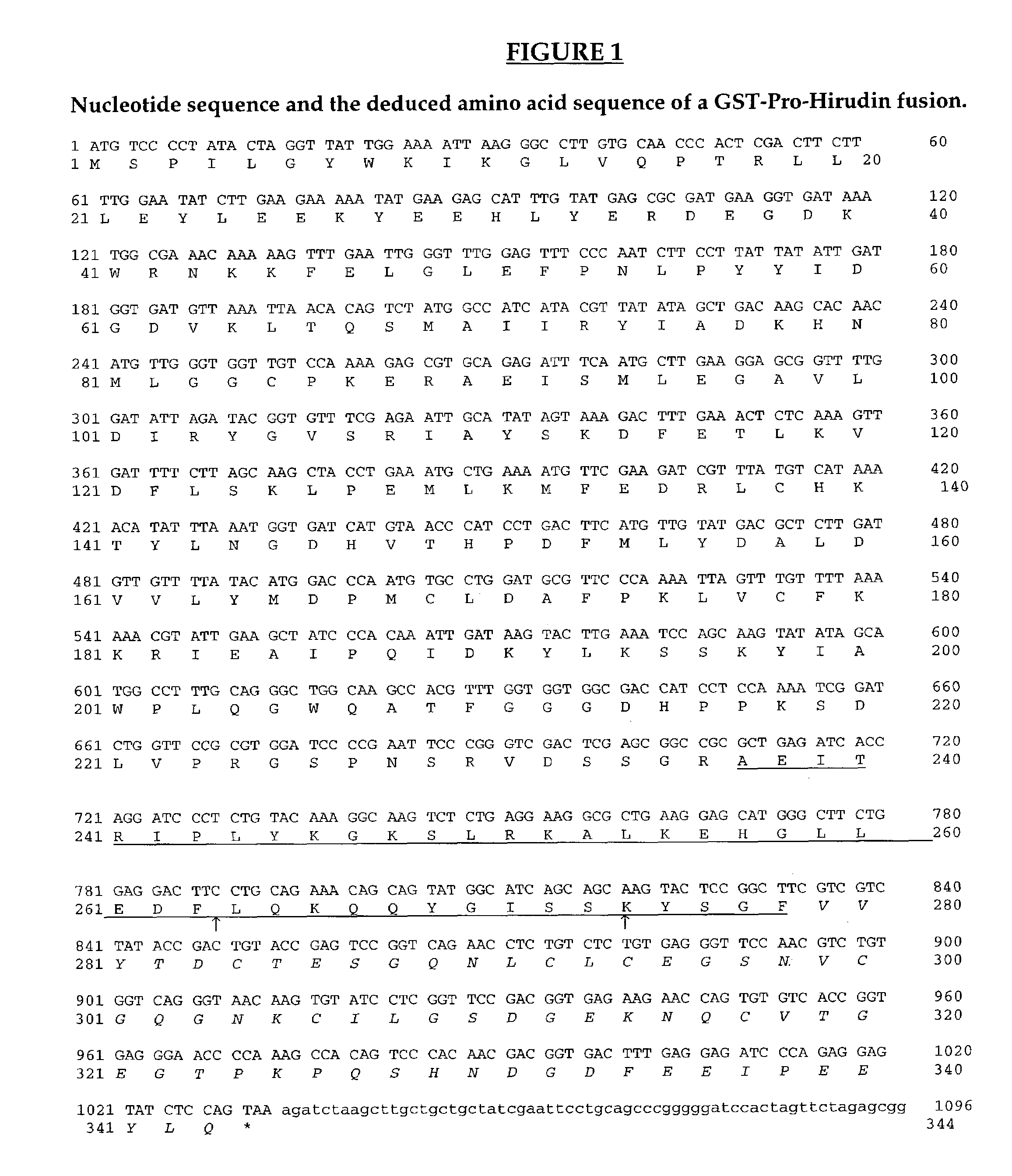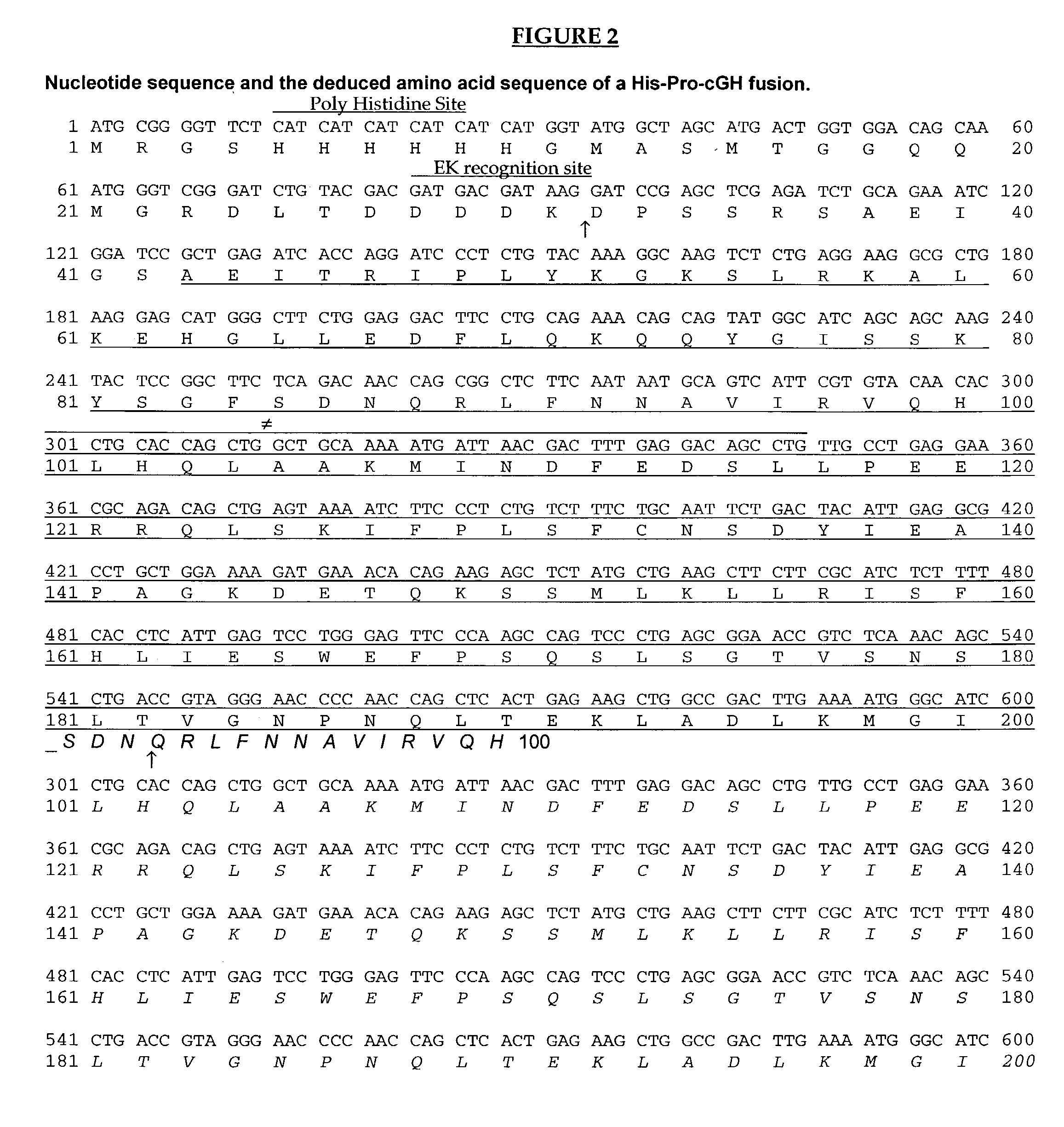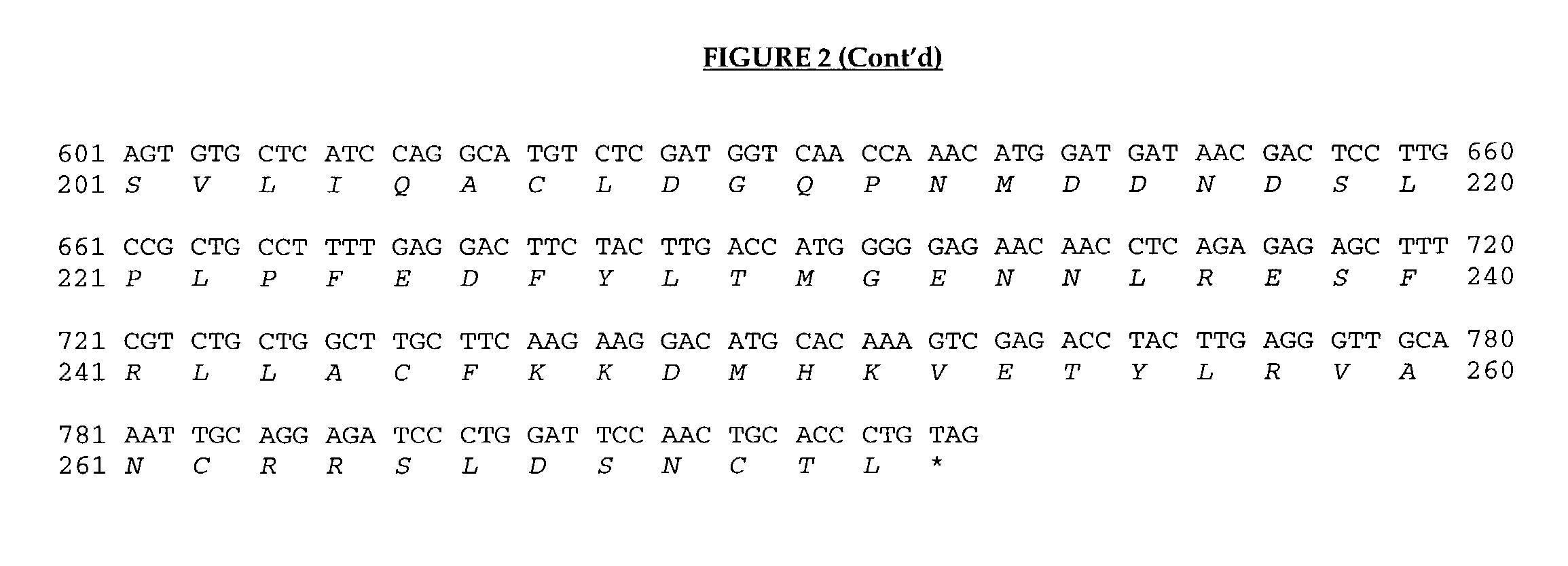Method for cleavage of fusion proteins
a fusion protein and cleavage technology, applied in the field of cleavage of fusion proteins, can solve the problems of inefficiency or lack of cleavage specificity of prior art cleavage methods, difficult protein purification, and reduced amount of active protein that can be recovered
- Summary
- Abstract
- Description
- Claims
- Application Information
AI Technical Summary
Benefits of technology
Problems solved by technology
Method used
Image
Examples
example 1
[0105]In the first example, the protein hirudin was prepared as a fusion protein with the chymosin pro-peptide and hirudin was shown to be active in cellular extracts of E. coli upon performance of a cleavage reaction.
Construction of a pGEX-Pro-Hirudin Fusion
[0106]The fusion protein that we studied comprises the pro-peptide of calf chymosin B (Foltmann et al, 1977; Harris et al., 1982, Nucl. Acids. Res., 10: 2177-2187) fused to hirudin variant 1 (Dodt et al., 1984, FEBS Letters 65: 180-183). The hybrid gene which encoded this fusion protein was constructed using standard PCR methods (Horton et al., 1989, Gene, 77: 61-68). The DNA sequence for this Pro-Hirudin fusion was cloned into pGEX-4T-3 (Pharmacia), downstream of the gene encoding glutathion-S-transferase (GST). The complete sequence of the GST-Pro-Hirudin sequence is shown in FIG. 1.
Growth of E. coli Transformed with pGEX4T-3 and pGEX-Pro-Hirudin
[0107]Plasmids pGEX-4T-3 and pGEX-Pro-Hirudin were transformed into E. coli. strai...
example 2
[0111]In the second example, the protein carp growth hormone (cGH) was prepared as a fusion of pro-chymosin. Carp growth hormone was shown to be present in cellular extracts of E. coli upon performance of the cleavage reaction.
Construction of a pHis-Pro-cGH Fusion
[0112]A fusion protein was constructed which comprises the pro-peptide of calf chymosin B (Foltmann et al., (1977), Harris et al., 1982, Nucl. Acids Res. 10: 2177-2187 fused to carp growth hormone (Koren et al. (1989), Gene 67: 309-315). The hybrid gene which encoded this fusion protein was constructed using PCR mediated gene-fusion. The DNA sequence for this Pro-cGH fusion was cloned into pUC19 yielding plasmid pPro-cGH. The Pro-cGH gene fusion was released from pPro-cGH by SwaI / Kpnl digestion and inserted into the PvuII / KpnI site of pRSETB (Invitrogen Corp.), containing a poly-histidine tag, facilitating purification, and an enterokinase recognition and cleavage site to generate pHis-Pro-cGH. The complete sequence of the ...
example 3
[0116]In this example, the protein carp growth hormone (cGH) was prepared as a fusion of pro-chymosin. The carp growth hormone fusion protein was cleaved with the gut extract from red turnip beetle, thus illustrating an in vivo application of the invention.
[0117]His-Pro-cGH was prepared following the protocol of example 2. Gut extract was prepared from larvae of the red turnip beetle as follows. Red turnip beetle eggs (Entomoscelis americana Brown (Coleoptera: Chrysomelidae), were laid by laboratory-reared adults and stored at −20° C. for at least three months before use. Eggs were hatched in dishes containing moist filter paper, and larvae were maintained on canola seedlings. Only larvae that were actively feeding were used. Midguts from second instar larvae were removed by dissection in saline solution and stored in saline at −20° C. Guts were thawed, rinsed in ddH2O (50 μl per gut). The homgenate was centrifuged at 16,000×g (10 min, 4° C.) and the decanted supernatant was used in...
PUM
| Property | Measurement | Unit |
|---|---|---|
| pH | aaaaa | aaaaa |
| pH | aaaaa | aaaaa |
| pH | aaaaa | aaaaa |
Abstract
Description
Claims
Application Information
 Login to View More
Login to View More - R&D
- Intellectual Property
- Life Sciences
- Materials
- Tech Scout
- Unparalleled Data Quality
- Higher Quality Content
- 60% Fewer Hallucinations
Browse by: Latest US Patents, China's latest patents, Technical Efficacy Thesaurus, Application Domain, Technology Topic, Popular Technical Reports.
© 2025 PatSnap. All rights reserved.Legal|Privacy policy|Modern Slavery Act Transparency Statement|Sitemap|About US| Contact US: help@patsnap.com



